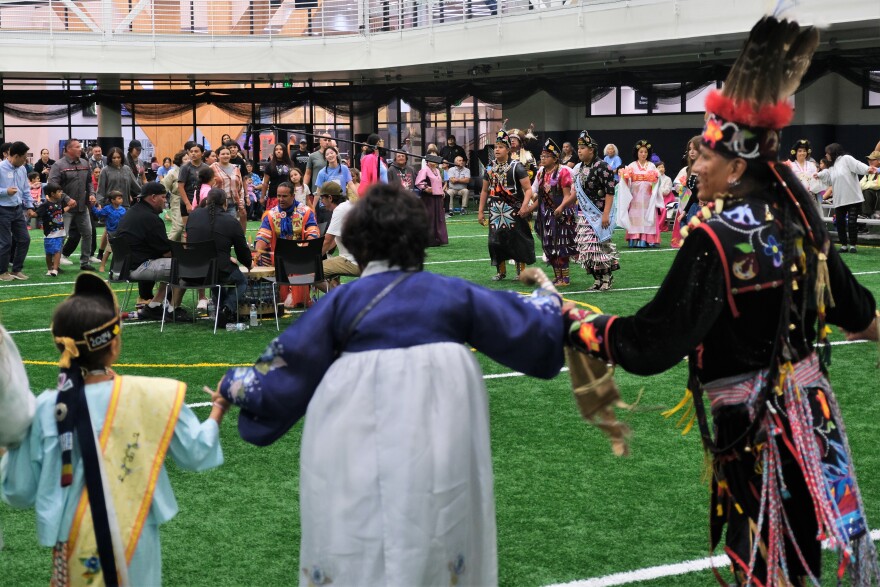A group of men sits around a large drum in the middle of the turf field at the Forest County Potawatomi Community Center.
As they beat out a song, tribal members in full regalia dance in a circle around them.
Later in the evening, a group of Korean-Americans visiting from the east coast sit in a half circle in the middle of the same field.

Each of them dressed in their regalia with their own drums as they beat out a traditional Korean drum song.
While each group’s drumming holds a different meaning, the similarities in the sound and purpose are noticed by the crowd.
That was the overarching goal of the week-long cultural exchange program.
Forest County Potawatomi Members share parts of their culture with the 50-plus visiting Koreans and vice versa so that the two groups can learn from one another through their music, their languages, and their histories.
“The Korean people, the Korean history. We’ve had a very hard time,” said James Kim, the director of the Native American Cultural Exchange Fellowship.
He and most of the people visiting Forest County Potawatomi Community as part of the program were born in Korea and immigrated to the U.S. anywhere from a few years to decades ago.
Between 1910 and 1945, Korea was ruled as part of the Empire of Japan.
The Korean people were stripped of their language, religion, and culture.

Kim says he sees what happened to Koreans reflected in what happened to indigenous people in America.
“We lost so many things. Not just the natural resources, but also the people. Many people got killed. Many people became refugees over in other countries. Same thing probably Natives [Americans] went through. A similar system like a boarding school. The Koreans also just went through a hard history.”
Lavara Gilpin is a summer day camp counselor at the Potawatomi Community Center who has been spending the week with the visitors.
“It definitely made me emotional talking about it and thinking about it,” said Gilpin. “We have a mural in the hall by the aquatic center. It’s for MMIW. One of them brought up their past, 100 years ago with the Japanese. We related on a lot of topics. We just kind of had that moment of realization of how much we are alike. I didn’t realize how alike we were.”
Because of their similar histories, Kim strongly believes they should have a shared future.
“When we see the future of our children and next generation they need to have an understanding of other people, especially the Native American people who were originally the first nation, first people here in this country,” said Kim.
That’s what the two groups have done this week and in similar weeks for the last four years.
They’ve increased their understanding of one another through shared conservations.
“The conversations we have at tables in the commons. I’ve had really great conversations with old friends and new friends. One claims that I’m her auntie and she wants to move here and stay with us. That feels amazing. To hear that,” said Gilpin.
Shared their favorite sports.
“Volleyball is a really fun sport. To play with everybody is just exhilarating,” said Marcus Daniels, a Forest County Potawatomi member who has also been spending the week with the Korean-American visitors. “I’m trying to get back into it and to do it with my friends, co-workers, and our guests, it’s been amazing. I’m on cloud nine.”
And share their favorite foods.
“When I saw the indigenous food. Especially the venison with wild rice. It was really similar to ours. Even though it was different ingredients, different meat it was actually like the food from my childhood that my mother prepared. Even with the different ingredients. It was really good,” said Kwangha Kim who traveled from Michigan for the cultural exchange program.
While the cultural exchange week has come to an end, everyone is leaving it will new memories and friendships and a hope that it will continue in the generations to come.
“I’m excited to share this with them. To see theirs, to see ours, to do that all together is really cool,”’ said Gilpin.
More than 180 Korean-Americans part of the fellowship program visited four different tribes in Wisconsin this week.
This is their 11th year visiting tribes in Wisconsin as part of the fellowship and the 4th year visiting Forest County Potawatomi.


















